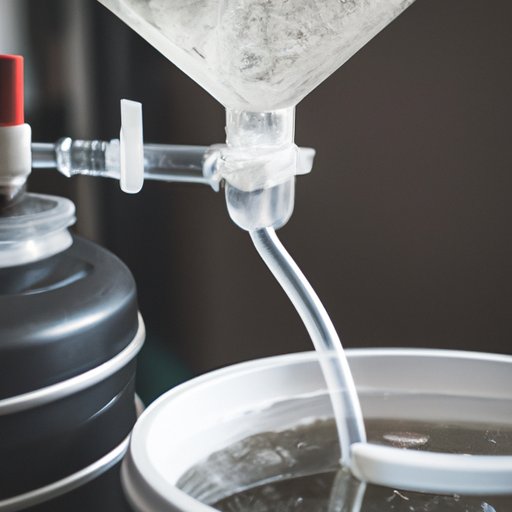Introduction
Distilled water is pure and free from contaminants such as minerals, metals, and chemicals. It is essential in medical, industrial, and specific household applications. This article explores how distilled water is made, its benefits, and how to make it at home.
The Science Behind Distilled Water
Distilled water is produced through the distillation process, which involves heating water to create steam and then cooling it to produce pure water. The impurities that remain behind as solids after heating and turning the water into vapour will be removed, leaving pure water. This process eliminates impurities such as minerals, metals and chemicals, making it purer than tap water.
DIY Distilled Water
Distilled water can be made at home without any special equipment. However, a few tools are required, including a large stainless steel pot with a lid, a wire rack, a glass jug, and ice.
The first step is filling the pot with tap water. Place the wire rack at the base of the pot, and over the wire rack, place the glass jug. Ensure that the lid of the pot is reversed to face downwards such that the knob is over the glass jug. Remember to remove the knobs if it interferes with the jar’s placement.
The heating process occurs in four steps. Begin by heating the water until steam begins to form, monitoring the process to ensure that the water doesn’t boil over. Once the steam begins to form, lower the heat and place ice cubes on top of the pot’s overturned lid. The steam created will begin to condense and form pure water, which will then drip down into the glass jug. The process is complete when the pot dries out, which means that all the water has evaporated. The distilled water collected in the glass jug is suitable for immediate use.
The Benefits of Distilled Water
The benefits of distilled water are numerous. Distilled water is typically used for medical sterilisation, preparing baby formula, and certain industrial and household applications that require clean water. Moreover, it can be consumed as drinking water, and some health experts believe that it is beneficial to human health. This is because distilled water is rid of potentially harmful impurities typically found in other kinds of water; yet, it retains some essential minerals that other types of water lack.
Distilled Water vs Other Types of Water
There are various types of water available, including tap water, purified water and spring water. Tap water is often chlorinated and is therefore not suitable for certain applications. Purified water is filtered through various processes to eliminate impurities while spring water comes from natural sources and may contain minerals and other contaminants. Distilled water is, however, the purest form of water since it is process by the distillation process, which removes all impurities. The type of water recommended for different uses varies, for instance, drinking distilled water is recommended in specific situations, while purified or spring water may be ideal for other applications
The Cost of Distilled Water
The cost of buying distilled water varies, with prices as high as $2 per gallon. However, everyone can make their distilled water at home for a few cents per gallon. Initial costs for equipment such as a stainless steel pot may be high, but the long-term savings will be significant.
Safety Measures for Making Distilled Water
Distillation must be done with caution and following safe measures. Since distilled water is vulnerable to picking up impurities, it is recommended that you wash your hands to avoid microbial contamination during the process. Additionally, ensure that that all your equipment and utensils are clean and dry, and the apparatus used to collect the distilled water is sterilised, mostly when planning to use the water for medical purposes. Finally, keep your workspace tidy to avoid possible breakages and incidents in the process.
Conclusion
Distilled water is an essential requirement in many industrial and medical applications. The process of making distilled water is simple, easy, and cost-effective, with numerous benefits to human health as well as household and industrial applications. With this guide, you can produce your distilled water at home and enjoy the advantages of free pure water.
